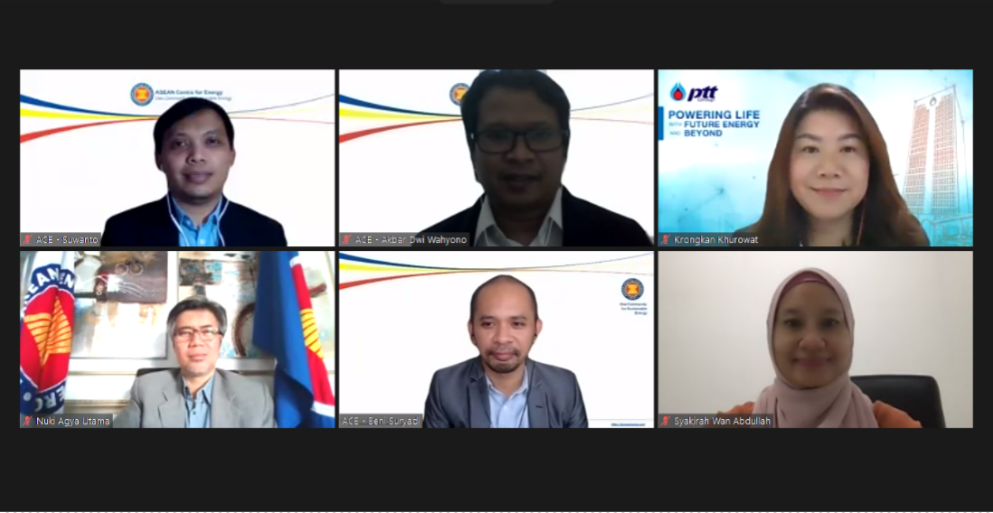Jakarta, 08 September 2021

To provide a knowledge repository for ASEAN Member States (AMS) and services through data management, publication and dissemination, the ASEAN Centre for Energy (ACE) becomes a Knowledge Hub to facilitate the regional energy cooperation in Southeast Asia. One of the ACE’s products is the ASEAN Energy Database System (AEDS). It contains official ASEAN statistic data and related energy news and policies to help the public understand the energy landscape of ASEAN countries. As part of the AEDS, ACE launched reports on (a) ASEAN Oil and Gas Updates 2021, and (b) ASEAN Power Updates 2021. The ASEAN Oil and Gas Updates 2021 provides an updated and comprehensive overview of the current oil and natural gas situation ASEAN. Whereas the ASEAN Power Updates 2021 provides an updated and comprehensive overview of the electricity and renewables situation ASEAN.
The two reports were launched through a public webinar held by ACE on September 8th, 2021, at 2 PM Jakarta time. The webinar began with the key message delivered by Dr Nuki Agya Utama, the Executive Director of ACE. He mentioned that according to the reports, not only COVID-19 pandemic has affected the production of oil which led to the decrease in amount, but it has also impacted the region’s power sector. Therefore, an updated data and information on the energy status are crucial for all stakeholders in designing and implementing the relevant policies and programmes, particularly in this challenging era.
The webinar then continued with the launch of the ASEAN Oil and Gas Updates 2021, presented by Mr Suwanto, the lead author of the report and the Technical Officer of Power, Fossil Fuel, Alternative Energy and Storage (PFS) Department in ACE. Mr Suwanto presented the findings of the report, including the Oil and Gas Production, Oil and Gas Consumption, and the impact of COVID-19 on Oil and Gas sector. He delivered that oil and gas production was declining as well as its reserves compared to 2010. He highlighted that 2020 was the lowest point in oil production since the last five years. Then, the pandemic impacted on decreasing oil prices and reduction of oil and gas demand, of which around 70% of oil consumption was used in the transportation sector while natural gas was used mainly for power generation in the industrial sector.
The moderator, Mr Beni Suryadi as the Manager of PFS department in ACE, then invited Mrs Krongkan Khurowat to comment on the report. Mrs Krongkan Khurowat is the Vice President of the International Business Strategy and Development Department from PTT PLC Thailand. She said that it is undeniable that the pandemic has affected the oil and gas industry. However, the future of global oil demand growth should resume as forecasted that by the end of 2022, oil demand will exceed the pre-pandemic level in 2019 as well as gas demand which will continue to recover in line with the economic recovery.
Following the second agenda is the launch of the ASEAN Power Updates 2021, presented by Mr Akbar Dwi Wahyono, the lead author of the report and the Technical Officer of PFS department in ACE. Mr Wahyono delivered the key highlight of the report such as the amount of 282GW electricity generated in 2020 – which coal, gas, and hydro contributed for more than 80% of the total installed capacity. He mentioned that renewable energy development in ASEAN continues to advance, where ASEAN recorded a new trend of reaching 82% of the ASEAN additional capacity in 2020. Although COVID-19 pandemic has affected the continuation of further renewable energy development in the region, ASEAN should be proud of having achieved 33.5% share of RE installed capacity in 2020, leaving only 1.5% gap from the regional target by 2025.
Ir Ts Wan Syakirah Wan Abdullah, the Head of Business Assessment and Engineering from TNB Renewables Malaysia, was then invited to comment on the report. She analysed that the renewables will be the main focus in the ASEAN region for the next 10-20 years. She also emphasised that the new upcoming power generation would be the cleaner energy, which she ultimately believes that renewable energy is one of the major contributors.
Watch the webinar at https://www.youtube.com/watch?v=lUb9z2zwarE
Read more reportage
(GI)